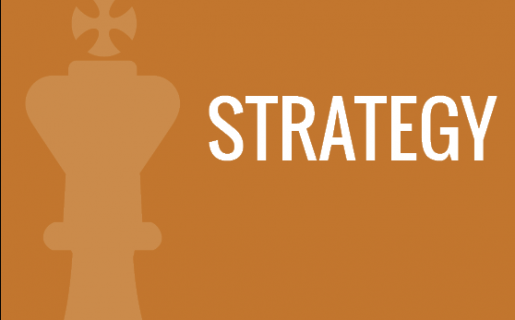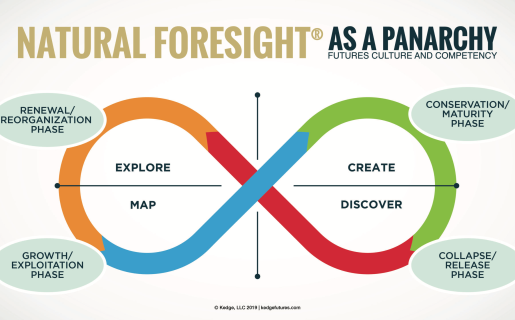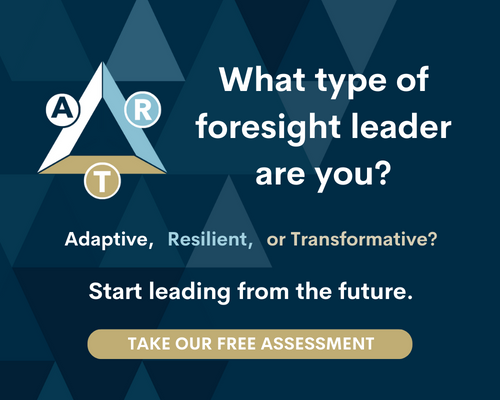Foresight-Fueled Strategy Case Study
An excerpt from The Guide to Natural® Foresight Framework: The following case study showcases the value, in terms of practical impact and tangible outcomes, that foresight drives in strategy. Situation A North American Fortune 500 retail chain was launching its first effort to integrate talent management strategies across the enterprise. A team of more than 50 executives was tasked to create a holistic approach to development, recruitment, retention, and compensation. In the process, they quickly realized they also needed a…
Driving Impact in Strategy
While commonly used in business planning and development efforts, Strategic Foresight differs from strategic planning, which relies largely on spreadsheet based models to extrapolate historical performance into a linear future plan.
The Origins of Natural Foresight®
The Natural Foresight® Framework mirrors complex systems and, ultimately, the model of the nested panarchy. This excerpt from The Guide to the Natural Foresight Framework explains the theories supporting the Natural Foresight® Framework. It discusses how the framework not only helps us to leverage complexity as a foundational principle for robust foresight, but it also provides a practical and intuitive approach to futures literacy.
Armed Against the Sea of Uncertainties
“Whether ‘tis nobler in the mind to suffer the slings and arrows of outrageous fortune, or to take arms against a sea of troubles and by opposing, end them.” Imagine, if you will, a dark and stormy night. Terror crackles or rips, or snaps through the streets like a live wire. Panicked voices cry from every corner. Newscasters with shaky voices urge the public to remain calm, to no avail. Then out of the darkness, with flashing eyes and gnashing…
Strategy for the 21st Century
By: Joana Lenkova During the Warring States period (475-221 BC) in Chinese history characterized by perpetual wars between divided states, strategists offered advice on how to conduct war, receiving payment for their services. These first strategy consultants were a group of traveling philosophers inclusive of people such as Confucius and Sun Tzu. Today in strategy, we often use the metaphor of war quoting Sun Tzu. However, “The Art of War” was written 2500 years ago and while the statements might…
It’s Time to Democratize the Future
“What problem are you solving?” The question is so important because of the big world problems that each and every one of us must address such as climate change, economic inequality and population displacement. However, it’s also a question for the hoard of tech-crazed unicorn chasers who are creating the next wave of supposedly indispensable gadgets. Are they solving problems, or creating solutions where no problems exist? The definition of success in the land of technotopia certainly feels a little…
The Future of Work
When doing this for a Future of Work project, I was able to identify multiple key points that struck me as being critical for setting us up for success in the face of the the ambiguous challenges of the future.
Why “Ridiculous” Maps of the Future are Useful
Developing and executing business strategy, products and innovative ideas in our current environment demands new approaches and mindsets. Linear methods that rely solely on the extrapolation of historical results are completely ineffective as technological advancements, economic uncertainty, and increased systematic risk become the new normal. To effectively drive understanding, performance, and execution of strategic initiatives, organizations must think and act in “simultaneous multiples” – pressure-testing their strategies in diverse operating environments.
Mashup Hit: Foresight, Speculative Design and Design Fiction
Mashups result from the creative blend of two or more songs, overlaying lyrics from one hit onto the instrumental beats of another.
Transforming Libraries
Public libraries have long been considered to be on the brink of irrelevancy and extinction, fending off assertions that Google would replace librarians – the original “search engines” – or that eBooks would replace print books. Thus, it’s easy for the technophiles to imagine that libraries as “repositories” would no longer be necessary. Nevertheless, libraries were fundamentally designed to evolve and transform into places and platforms of innovation and collaboration. What sets libraries apart from most organizations and institutions is…











